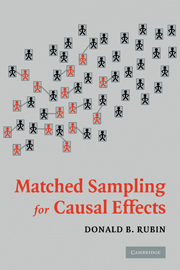Book contents
- Frontmatter
- Contents
- Contributor Acknowledgments
- Matched Sampling for Causal Effects
- My Introduction to Matched Sampling
- PART I THE EARLY YEARS AND THE INFLUENCE OF WILLIAM G. COCHRAN
- PART II UNIVARIATE MATCHING METHODS AND THE DANGERS OF REGRESSION ADJUSTMENT
- PART III BASIC THEORY OF MULTIVARIATE MATCHING
- PART IV FUNDAMENTALS OF PROPENSITY SCORE MATCHING
- PART V AFFINELY INVARIANT MATCHING METHODS WITH ELLIPSOIDALLY SYMMETRIC DISTRIBUTIONS, THEORY AND METHODOLOGY
- PART VI SOME APPLIED CONTRIBUTIONS
- PART VII SOME FOCUSED APPLICATIONS
- 23 Criminality in XYY and XXY Men
- 24 Practical Implications of Modes of Statistical Inference for Causal Effects and the Critical Role of the Assignment Mechanism
- 25 In Utero Exposure to Phenobarbital and Intelligence Deficits in Adult Men
- 26 Estimating Causal Effects from Large Data Sets Using Propensity Scores
- 27 On Estimating the Causal Effects of DNR Orders
- Conclusion: Advice to the Investigator
- References
- Author Index
- Subject Index
24 - Practical Implications of Modes of Statistical Inference for Causal Effects and the Critical Role of the Assignment Mechanism
Published online by Cambridge University Press: 05 June 2012
- Frontmatter
- Contents
- Contributor Acknowledgments
- Matched Sampling for Causal Effects
- My Introduction to Matched Sampling
- PART I THE EARLY YEARS AND THE INFLUENCE OF WILLIAM G. COCHRAN
- PART II UNIVARIATE MATCHING METHODS AND THE DANGERS OF REGRESSION ADJUSTMENT
- PART III BASIC THEORY OF MULTIVARIATE MATCHING
- PART IV FUNDAMENTALS OF PROPENSITY SCORE MATCHING
- PART V AFFINELY INVARIANT MATCHING METHODS WITH ELLIPSOIDALLY SYMMETRIC DISTRIBUTIONS, THEORY AND METHODOLOGY
- PART VI SOME APPLIED CONTRIBUTIONS
- PART VII SOME FOCUSED APPLICATIONS
- 23 Criminality in XYY and XXY Men
- 24 Practical Implications of Modes of Statistical Inference for Causal Effects and the Critical Role of the Assignment Mechanism
- 25 In Utero Exposure to Phenobarbital and Intelligence Deficits in Adult Men
- 26 Estimating Causal Effects from Large Data Sets Using Propensity Scores
- 27 On Estimating the Causal Effects of DNR Orders
- Conclusion: Advice to the Investigator
- References
- Author Index
- Subject Index
Summary
Abstract: Causal inference in an important topic and one that is now attracting serious attention of statisticians. Although there exist recent discussions concerning the general definition of causal effects and a substantial literature on specific techniques for the analysis of data in randomized and nonrandomized studies, there has been relatively little discussion of modes of statistical inference for causal effects. This presentation briefly describes and contrasts four basic modes of statistical inference for causal effects, emphasizes the common underlying causal framework with a posited assignment mechanism, and describes practical implications in the context of an example involving the effects of switching from a name-brand to a generic drug. A fundamental conclusion is that in such nonrandomized studies, sensitivity of inference to the assignment mechanism is the dominant issue, and it cannot be avoided by changing modes of inference, for instance, by changing from randomization-based to Bayesian methods.
INTRODUCTION
Causal Inference
Causal inference is a topic that statisticians are addressing more vigorously and rigorously in recent years. This is a desirable development for statistics, as supported by Cox's (1986) comment on Holland (1986b) that “ the issues explicitly and implicitly raised by the article seem to me more important for the foundations of our subject than the discussion of the nature of probability ”.
Information
- Type
- Chapter
- Information
- Matched Sampling for Causal Effects , pp. 402 - 425Publisher: Cambridge University PressPrint publication year: 2006
